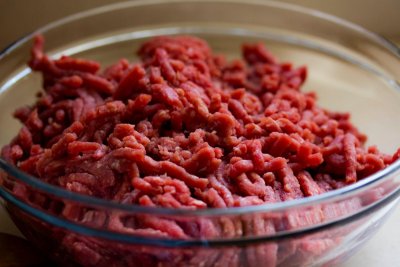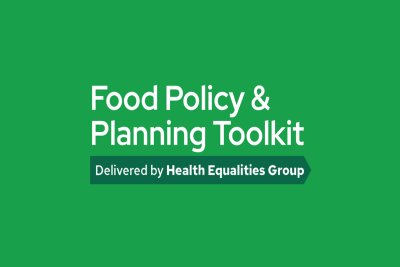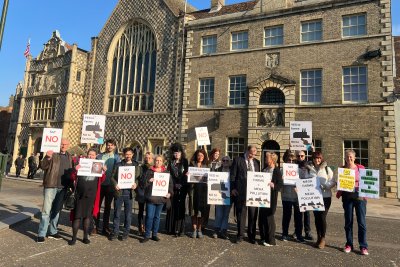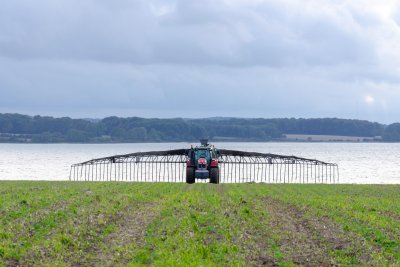 Delegates at the Liberal Democrat Party Conference in Bournemouth, September 2023.. Credit: Ruth Westcott
Delegates at the Liberal Democrat Party Conference in Bournemouth, September 2023.. Credit: Ruth Westcott

Liberal Democrats announce new food and farming policy
The Liberal Democrats would introduce free primary school meals, boost farmer support by £1billion, ensure public sector food reflects a sustainable diet and stop pollution from intensive livestock in our rivers.
During the Liberal Democrat Party Conference in Bournemouth, Tim Farron MP and Stuart Roberts, farmer and chair of the food and farming policy working group, introduced a key policy paper on food and farming. The conference also saw the tabling of a policy paper on tackling the nature crisis, with both voted comfortably through by members.
The papers will form the cornerstone of the party's manifesto for a 2024 General Election. Some of the key policies announced, and those most relavent to the Sustain alliance, are:
Food and Farming Policy Paper
Farming:
- A National Land and Sea Use Strategy, including a horticulture strategy to encourage the growth of the horticulture sector.
- The introduction of minimum standards for all farms - the Sustainable Land Standard - as a regulatory baseline for sustainable farming and land use. The standards would come with investment in enforcement with imports required to meet equivalent standards.
- A national nitrogen balance sheet to manage nitrate pollution.
Farm Payments:
- Implementation of Environmental Land Management schemes (ELMs) by 2027 and £1bn increase to the ELMs budget.
- Removal of the 5-hectare eligibility criteria for ELMs payments, to allow smaller farms to be eligible for support
- Establishment a financial support scheme (ADAS), to provide training and support for accessing finance, free at the point of use, for all farmers.
- Payments to go to land workers rahter than landowners.
- Allocation of funds for public goods like animal welfare, food waste reduction, infrastructure, skills, and higher wages.
- Farms not part of ELMs to be ineligible for public funding.
- Phase out of subsidies for biofuels from food crops, and support only biogas from waste products like tallow or used cooking oil.
Public Procurement:
- Minimum buying criteria for public catering to require environmental and social sustainability, including organic, Fairtrade, and deforestation-free food.
- Promotion of nutritious and healthy foods, with a focus on sustainable British produce.
- Support for local and seasonal food, alternative proteins and high animal welfare standards.
- Reform of procurement to make it easier for SMEs to bid for contracts, reducing dominance by large catering companies.
Antimicrobial Resistance:
- Tackling of overuse of antimicrobials in industrial livestock production, including committing to match EU's 2022 rules on antibiotic use.
- Rewards for farmers through public funding for adopting sustainable animal management practices.
Food Security:
- Investigate profiteering by food retailers.
- Expand the Groceries Code Adjudicator's powers to cover the entire food supply chain and ensure the Adjudicator covers all food retailers.
Local and Community Food:
- Encouragement in planning for new allotments and regeneration of neglected ones.
- Restoration of market garden hinterlands around towns and cities.
- Encouragement to local authorities to allocate more space for allotments.
Food Poverty and Nutrition:
- Extension of free school meals to all primary school children and secondary school children in receipt of Universal Credit.
- Healthy and nutritious meals in schools.
- Provision of health information on High in Fat, Salt, and Sugar (HFSS) foods.
End Food Poverty:
- Aim to end food poverty within a decade.
- A 'Right to Food' in UK law.
- Ensuring elderly people have their care needs met, including free personal care.
Food Deserts and Community Planning:
- Reform and properly resources for the planning system.
- Fast food outlets to be located away from schools.
- Access to fresh produce ensured in communities.
- Introduction of nutrition education for medical students and healthcare professionals.
Advertising:
- Health information labels to be added to HFSS advertising and packaging.
- Stricter advertising restrictions on HFSS foods.
- Strengthen the Soft Drinks Industry Levy, including juice and milk-based drinks high in added sugar.
Fishing and Seafood:
- Fair allocation of quotas for fishing communities, and infrastructure investment.
- Meaningful and measurable targets for fisheries management to recover fish stocks
- Promotion of locally produced seafood through public procurement.
- Data gaps to be addressed for all species
- Mandated Remote Electronic Monitoring with cameras on commercial fishing vessels.
- High environmental and welfare standards on English fish farms.
Trade and Development:
- Ensure British standards are maintained in all trade deals, including renegotiating existing key trade deals.
- Democratic scrutiny of all trade deals.
- Regulatory alignment with EU standards agencies.
- Veterinary and sanitary agreements with the EU.
Other commitments:
- Restore the International Development budget to 0.7% of Gross National Income.
- A research and innovation fund, including investing in emerging technologies and home-grown pulses.
- Promotion of alternative meats and foods based on pea, soya, wheat proteins, vegetables, and mycoprotein.
- A simpler traffic light labelling system for nutrition and health.
Tackling the Nature Crisis Policy Paper
Reforming the Planning System:
- New statutory purposes for planning, to make environmental improvement and quality of life explicit purposes, and require planning decisions to contribute to statutory nature and climate targets.
- Promotion of healthy and sustainable place-making plans
- Planning choices to be required to align with nature recovery and net-zero goals.
- Link Local Nature Recovery Strategies with planning decisions.
Nutrient Budgets:
- Nutrient budgeting to be introduced in English catchments to manage nutrient pollution.
- Restrictions on decisions that would exceed natural nutrient limits.
- Encouragement of sustainable nutrient application where it benefits the land.
- Projects in areas with excess nutrients to be required to demonstrate 'nutrient negativity.'
Blue Corridors:
- Halting of pollution from sewage, slurry, fertilisers, pesticides, and industry in rivers and streams.
- New 'blue flag' standards for rivers, streams, and lakes.
- All England's rivers to be suitable for swimming.
- Introduce a 'blue corridor' program to enhance rivers' accessibility and health for wildlife and people.
- Require catchment management plans to include habitat corridors along major waterways, natural regeneration of riverside areas, and flood plain reconnection.
Ruth Westcott, climate and nature emergency coordinator at Sustain said:
"We are in an emergency. Our food system is responsible for about a third of greenhouse gas emissions and is the leading cause of biodiversity loss and river pollution. These policies, in particular setting high standards for public sector food and tackling the proliferation of industrial livestock farming, are fantastic and would set us firmly in the right direction. These are also areas that local councils can take action on now - they have the power to act on procurement and planning policy."
Fran Bernhardt, campaign coordinator, children's food campaign, said:
“Evidence shows unhealthy food adverts drive diet-related diseases. So it’s brilliant to see the Lib Dems recognise that advertising restrictions provide a key opportunity to champion our health. We look forward to seeing the robust commitments in their manifesto.”
Will White, campaign coordinator, sustainable farming campaign, said:
"ELMS needs to be improved in both scope and budget if it is to deliver for farmers and nature, and these proposed policies represent a big step in the right direction. Wide scale agroecological reform also hinges on the effective regulation of the stifling top down pressures that often unfairly burden our farmers, stemming from powerful actors such as supermarkets, processors, and packers. Therefore, the Liberal Democrats' commitment to extending the Groceries Code Adjudicator's (GCA) jurisdiction to encompass the entire supply chain is an exceptionally promising development."
Find out more about Planning for the Planet, Sustain's campaign to support councils to protect our rivers through planning policy.
Sustain: Sustain The alliance for better food and farming advocates food and agriculture policies and practices that enhance the health and welfare of people and animals, improve the working and living environment, enrich society and culture and promote equity.
Sustain
The Green House
244-254 Cambridge Heath Road
London E2 9DA
020 3559 6777
sustain@sustainweb.org
Sustain advocates food and agriculture policies and practices that enhance the health and welfare of people and animals, improve the working and living environment, promote equity and enrich society and culture.
© Sustain 2025
Registered charity (no. 1018643)
Data privacy & cookies
Icons by Icons8







